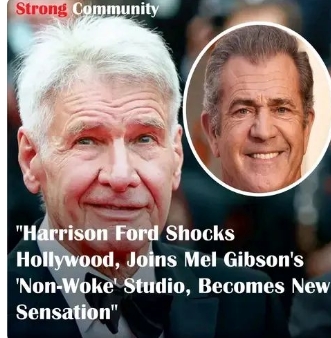CELEBRITY
NEW SENSATION: Harrison Ford Shocks Hollywood, Joins Mel Gibson’s ‘Non-Woke’ Studio, Becomes New Sensation”… See more

Harrison Ford Shocks Hollywood, Joins Mel Gibson’s ‘Non-Woke’ Studio, Becomes New Sensation”
In a move that has sent shockwaves through Hollywood, legendary actor Harrison Ford has signed on with Mel Gibson’s controversial new studio, which has gained attention for its ‘non-woke’ stance. Ford’s decision to join Gibson’s venture marks a significant shift in his career and has ignited a flurry of reactions from industry insiders and fans alike.
A Surprising Partnership
Harrison Ford, known for his iconic roles in blockbuster franchises such as Star Wars and Indiana Jones, has long been a figure synonymous with mainstream Hollywood. His recent decision to collaborate with Mel Gibson, a director and actor known for his outspoken views and controversial public statements, has taken many by surprise. Gibson’s studio, which promotes a ‘non-woke’ philosophy, has positioned itself as a counterpoint to what it describes as the excesses of contemporary political correctness in the film industry.
The partnership between Ford and Gibson signals a dramatic pivot from Ford’s previous work and affiliations. It underscores a broader trend in Hollywood where traditional and non-traditional approaches to filmmaking and storytelling are increasingly coming into conflict.
Gibson’s Studio and Its Philosophy
Mel Gibson’s studio has made headlines for its outspoken opposition to what it characterizes as ‘woke’ culture—a term used to describe heightened social awareness and progressive values in media. The studio has positioned itself as a bastion for more traditional or controversial storytelling, embracing themes and perspectives that often clash with current industry norms.
The studio’s approach has sparked debate, with some praising it for providing an alternative voice and others criticizing it for promoting regressive viewpoints. Ford’s involvement adds a high-profile dimension to the studio’s mission and amplifies the ongoing discourse about the direction of modern filmmaking.
Ford’s Bold Move
Harrison Ford’s entry into Gibson’s studio is seen as a bold and unexpected move, especially given his long-standing reputation as a mainstream Hollywood icon. Ford, whose career has spanned decades and included a wide range of critically acclaimed performances, is now aligning himself with a studio that has taken a provocative stance on contemporary issues.
This new chapter in Ford’s career is being watched closely by industry insiders, fans, and critics. His decision could potentially reshape his public image and influence his future roles and projects. For Ford, it represents an opportunity to engage with a different kind of storytelling and to explore new creative avenues.
Reactions and Implications
The reaction to Ford’s announcement has been mixed. Some see it as a refreshing challenge to the status quo, appreciating Ford’s willingness to step outside the bounds of traditional Hollywood. Others are skeptical, questioning whether the collaboration aligns with Ford’s previously established public persona and values.
The implications of this move are far-reaching. It may signal a shift in how veteran actors approach their careers and align themselves with projects that challenge conventional industry norms. Additionally, it highlights the ongoing cultural and political debates within Hollywood, reflecting broader societal conversations about the role of media in shaping and reflecting values.
Looking Ahead
As Harrison Ford joins Mel Gibson’s studio, the industry will be watching closely to see how this new partnership unfolds. Ford’s future projects with the studio could offer a glimpse into a different side of his artistic vision and might provoke further discussion about the direction of film and entertainment.
For now, the news of Ford’s collaboration with Gibson has firmly placed him in the spotlight, sparking conversations and debates across the entertainment landscape. As Hollywood continues to navigate its evolving cultural terrain, Ford’s bold decision represents a significant moment in the ongoing dialogue about the intersection of art, politics, and personal beliefs.
















